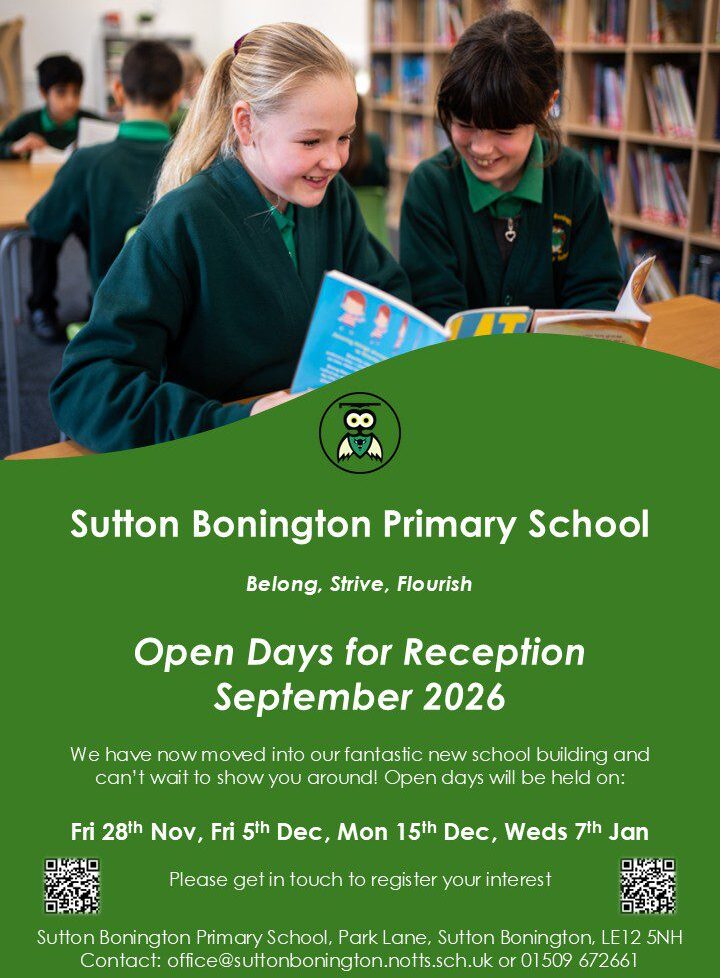Curriculum Intent
At Sutton Bonington Primary School, our music curriculum intends to inspire creativity, self-expression and encourages our children on their musical journeys as well as giving them opportunities to connect with others. We hope to foster a life- long love of music by exposing them to diverse musical experiences and igniting a passion for music. By listening and responding to different musical styles, finding their voices as singers and performers and as composers, all will enable them to become confident, reflective musicians.
The aims of our Music curriculum are to develop pupils who:
- Critically engage with live and recorded music, commenting on it using age-appropriate music vocabulary
- Sing with confidence and control
- Improvise and compose music for purpose using tuned and untuned instruments
- Play and perform both solo and in groups (voice and instruments)
- Begin to understand and use musical notation (at KS2)
Our curriculum intent is in line with that of the National Curriculum for Music.
Curriculum Implementation
The music curriculum ensures children sing, listen, play, compose, perform and evaluate music from a range of genre. This is embedded in the classroom activities as well as the weekly singing assemblies, various concerts and performances and the learning of instruments.
Through the musical program Singup, teachers are able to produce inclusive lessons for all children to access the musical curriculum in a fun and engaging way, further promoting a love of learning. The Singup programme is designed specifically for the teaching of music in primary schools. Singup lessons are planned in sequences to provide children with the opportunities to review, remember, deepen and apply their understanding.
The elements of music are taught in classroom lessons so that children are able to use some of the language of music to understand how it is composed, played and appreciated. In the classroom children will have opportunities to play a variety of instruments, enabling them to use a range of methods to create notes, as well as how to read basic music notation. They also learn how to compose, focusing on different dimensions of music, which in turn feeds their understanding when listening, playing, or analysing music. Composing or performing using body percussion and vocal sounds is also part of the curriculum, which develops the understanding of musical elements without the added complexity of an instrument.
Units are structured in blocks of three weeks or six weeks to give twelve units across the year. In reception, units are based on lessons of 30 minutes per week, which can be delivered additionally through elements of continuous provision. In Key Stage 1, units are based on 40 minute lessons per week and in Key Stage 2, lessons of 50 minutes per week. Singup units give lots of opportunities for children to compose, play and perform, enabling teachers to make judgements about children’s attainment and progress in music. The specific content of each unit is drawn from our knowledge and skills progression document to ensure appropriate coverage for the different year groups.
Within the Early Years Curriculum, children in Reception experience the Music curriculum through the ‘being imaginative and expressive’ early learning goal.
Adaptations for children with special educational needs and disabilities are made in line with our SEND Curriculum Adaptations document. These may include the use of additional scaffolding, explicit instruction, cognitive and metacognitive strategies, flexible groupings and use of specific resources or technology.
Our music curriculum is enriched by opportunities for all children to learn an instrument, engage in visits from musicians and watch assemblies where music is performed by our own children as part of their individual instrumental lessons. Additional private lessons are also available during the school day in partnership with outside providers.
Opportunities for children’s spiritual, moral, social and cultural development through Music are also explored where appropriate. For example, pupils’ cultural awareness is developed through the exploration of music from other countries, cultures and periods of time.
Curriculum Impact
By the end of Key Stage 2, we aim for our children to have developed a broad knowledge of a range of genres, styles and of the history of music. They will be able to build upon a range of knowledge, skills and understanding in order to listen, appraise, compose and perform pieces of music. Additionally, some children will have learned an instrument such as the recorder, guitar or violin through individual music lessons through ‘Rattle and Roll’ and will have engaged in a range of opportunities to perform to an audience. When reflecting, they will be able to appraise their compositions and the work of others. They will have an understanding of music from different periods of time and the distinct sounds and instruments that are used in a range of genre.
Assessments will be made by teachers listening to children perform, ongoing monitoring of key skills developed during lessons, talking with and questioning children as well as making observations and setting specific tasks. Teacher assessment is ongoing throughout the year with a formal summative assessment made and recorded at the end of the summer term.


